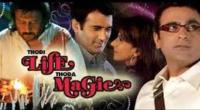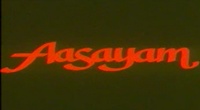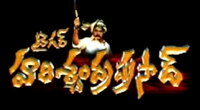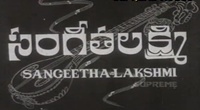Ernst Thälmann is an East German film in two parts about the life of Ernst Thälmann, leader of the Communist Party of Germany during much of the Weimar Republic, directed by Kurt Maetzig and starring Günther Simon in the title role. The first part, Ernst Thälmann - Sohn seiner Klasse (Son of his Class), was released in 1954. It was followed by the 1955 sequel. Ernst Thälmann - Führer seiner Klasse (Leader of his Class).
| Ernst Thälmann | |
|---|---|
A poster of Son of his Class near the Central Station of Leipzig, 1954. | |
| Directed by | Kurt Maetzig |
| Produced by | Adolf Fischer |
| Written by | Willi Bredel, Michael Tschesno-Hell |
| Starring | Günther Simon |
| Music by | Wilhelm Neef |
| Cinematography | Karl Plintzner |
| Edited by | Lena Neumann |
Production company | DEFA |
| Distributed by | Progress Film |
Release date | Sohn seiner Klasse:
Führer seiner Klasse:
|
Running time | Sohn seiner Klasse: 127 minutes Führer seiner Klasse: 140 minutes |
| Country | East Germany |
| Language | German |
| Budget | 10,000,000 East German Mark |
Screenplay
Ernst Thälmann - Son of his Class
After fellow soldier Johannes Harms reports that a revolution has broken out at home, Thälmann - who leads a revolutionary cell on the Western Front - and his friend Fiete Jansen rebel against their officers, Zinker and Quadde, and desert. Harms dies in a shelling. In Berlin, the American capitalist Mr. McFuller demands to crush the Spartacists. Zinker, now a member of the Freikorps, murders Karl Liebknecht and Rosa Luxemburg. Thälmann hears of it and promises their sacrifice will not be in vain. Jansen falls in love with Harms' daughter, Änne.
When Hamburg faces an attack by Zinker's forces, as part of the Kapp Putsch, the workers organize a general strike; after laborers are shot by the rebels, Thälmann ignores the bourgeoisie Social Democrats who reject violence, ambushes the Freikorps and captures their officers. The Social Democrat Police Senator Höhn frees them after they lightheartedly promise not to use violence.
Thälmann makes a speech in the USPD congress, calling to unite with the KPD, when the Soviet steamship Karl Liebknecht, loaded with wheat for the city's unemployed, reaches the port. Höhn sends Quadde, now a police captain, to prevent the distribution of the cargo, but after a stand-off the police retreat. Thälmann visits Vladimir Lenin and Joseph Stalin in Moscow with other German communists.
Thälmann and his friends organize a communist uprising in Hamburg, and manage to hold out against the Reichswehr and the police. Fiete killes Zinker. Then, a delegate from the Central Committee announces that armed struggle is no longer the policy of the party, and the weapons promised to them by the leadership will not arrive. The communists are forced to flee. Jansen is sentenced to death, but eventually his life are spared. Thälmann appears in the Hamburg harbor and promises not to abandon the struggle.
Ernst Thälmann - Leader of his Class
In 1930, Fiete Jansen is released from jail and is reunited with his wife, Änne. Thälmann, now a member of the Reichstag and chief of the KPD, assists the coal miners in the Ruhr to organize a massive strike after their wages are cut. When the presidential elections take place, veteran SPD member Robert Dirhagen is reluctant to support Paul von Hindenburg, although this is the party line. Thälmann calls for class unity against the Nazis, but the SPD leaders do not want to collaborate with him.
In the elections for parliament the KPD gains many seats and the Nazis lose two million votes. However, the Ruhr industrialists and Mr. McFuller support Adolf Hitler. Dirhagen is enraged to hear that the SPD will not oppose Franz von Papen's decision to allow Hitler into the government and tears his party card. The Nazis seize power.
The Nazis burn the Reichstag and accuse the communists, arresting many, including Thälmann and Dirhagen. Wilhelm Pieck and Jansen plan to rescue their leader with the aid of an Orpo jailer, but the SS guards - commanded by Quadde, now a SS Sturmbannführer - foil the plot. Fiete escapes abroad, joining the Thälmann Battalion in Spain, and later - after the Second World War begins - the Red Army's 143rd Guards Tank Division 'Ernst Thälmann'. Änne is arrested by the Gestapo. Hamburg is bombed, and she dies in her cell.
In August 1944, a German corps is encircled by the Red Army. Hitler orders its commanders to fight to the end. The Soviets send in Jansen with a group of German communists to convince the soldiers to defy the SS and surrender. Eventually, the Ernst Thälmann Division soldiers break through the German lines, liberate the local concentration camp - in which Dirwagen was held - and accept the German surrender after the SS were overpowered by Jansen's men. The communist Jansen and the Social Democrat Dirhagen shake hands. In Berlin, Thälmann leaves his cell to be executed, while contemplating on Pavel Korchagin's words from How the Steel Was Tempered: "...All my life, all my strength were given to the finest cause in all the world - the fight for the liberation of mankind."
- Günther Simon as Ernst Thälmann
- Hans-Peter Minetti as Fiete Jansen
- Erich Franz as Arthur Vierbreiter
- Erika Dunkelmann as Martha Vierbreiter
- Wolf Kaiser as Zinker
- Werner Peters as Gottlieb Quadde
- Nikolai Kryuchkov as Soviet colonel
- Michel Piccoli as Maurice Rouger
- Siegfried Weiss as industrialist
- Fritz Diez as Adolf Hitler
- Fred Delmare as soldier
- Hannjo Hasse as army officer
- Horst Kube as concentration camp commandant
- Angela Brunner as Irma Thälmann
- Arthur Pieck as Wilhelm Pieck (part 1)
- Hans Wehrl as Wilhelm Pieck (part 2)
- Karl Brenk as Walter Ulbricht
- Gerd Wehr as Wilhelm Florin
- Karl Weber as Friedrich Ebert
- Martin Flörchinger as Karl Liebknecht (part 1)/Saarland delegate (part 2)
- Judith Harms as Rosa Luxemburg
- Kurt Wetzel as army officer (part 1)/Hermann Göring (part 2)
- Hans Stuhrmann as Joseph Goebbels
- Eberhard Kratz as Fritz Tarnow
- Erich Brauer as Carl Severing
- Peter Schorn as Vladimir Lenin
- Gerd Jäger as Joseph Stalin (scenes removed)
- Steffie Spira as Clara Zetkin
- Joe Münch-Harris as Gustav Noske
- Hans Flössel as Philipp Scheidemann
- Karl-Eugen Lenkerring as Gustav Stresemann
- Fred Kötteritzsch as Franz von Papen
- Will van Deeg as Heinrich Himmler
- Georges Stanescu as Georgi Dimitrov
- Theo Shall as judge (part 1)/Marcel Cachin (part 2)
- Hubert Temming as Jacques Duclos
- Karl Heinz Weiss as Maurice Thorez
- Carla Hoffmann as Rosa Thälmann
Background
Ernst Thälmann, the Communist Party of Germany's chief who was executed by the Nazi regime in 1944 after spending 11 years in prison, was revered as a national hero and a martyr in the nascent East Germany. Thälmann's character combined communist convictions with an uncompromising struggle against Fascism; in a broader sense, he served as part of what author Russell Lemmons referred to as East Germany's "foundation myth": the belief that the communists were the most authentic anti-fascists, and therefore, their successors in the Socialist Unity Party of Germany were the legitimate leaders of a new German state. Thälmann became the center of what many historians saw as a cult of personality. This veneration required all controversial aspects of his political career be repressed from mass consciousness. Journalist Erich Wollenberg wrote that in the Ernst Thälmann films, "the Thälmann cult reached its apotheosis."
Inception
The film was conceived in 1948, after the Soviet Occupation Zone's provisional authorities and the leadership of the SED commissioned it; according to director Kurt Maetzig, "it was handed down from above". Willi Bredel and Michael Tschesno-Hell, both political functionaries, were exempted from all their other duties to concentrate on writing the script. A 'Thälmann Committee' was convened to direct the production of the film; its members included representatives from the Ministry of Culture, the Ministry of Press and Agitation, the DEFA studio, and Thälmann's widow, Rosa, although she was removed in 1949. The committee held its first meeting on 8 October 1948. At the third meeting, on the 27th, the members decided that portraying Thälmann's entire life would make the film too cumbersome, agreeing it should concentrate only on the important historical events. The resolution also stated that the plot should focus on meetings between Thälmann and small groups of people, who would be seen embracing Socialism after being convinced by "the radiance of his personality". At the fourth meeting, it was suggested to begin the plot only in 1931 and stress Thälmann's part in the 1932 public transportation strike; yet member Otto Winzer pointed out that in order to appeal to the youth, the picture should deal with the protagonist's earlier years.
Development
Bredel and Tschesno-Hell completed the first draft of the script in early 1951. The plot began with the four-year-old Ernst shoving socialist pamphlets in his trousers to hide them from the police officrs who raided his father's tavern, where an illegal meeting of the SPD took place. It also featured his childhood and youth with his parents, his falling in love with the young Rosa Koch and his years as a simple worker who turned to communism.
DEFA concluded that Bredel's and Tschesno-Hell's script would require splitting the film into three parts. This was deemed to long by the committee. After a year of deliberations, most of the original screenplay was rejected. In January 1951, it was decided to have a two-part picture, the first dealing with the time from the end of World War I to 1930, and the second taking off in 1932 and continuing until the founding of the German Democratic Republic. The two parts were named Ernst Thälmann - Sohn des Volkes and Ernst Thälmann - Führer des Volkes (son and leader of the people, respectively). The titles were later changed to Sohn and Führer seiner Klasse.
The political establishment had closely monitored the work. According to historian René Börrner, "no other film, in the years before or after, received such attention from the SED". On 21 August 1951, Walter Ulbricht sent the committee a letter in which he requested that a meeting between Thälmann and Joseph Stalin would be portrayed.
There were other political concerns, as well. Under the influence of events in the Soviet Union, the Ministry of Culture accused the DEFA filmmakers of taking up a Formalistic approach, and demanded they reject it and adopt a Socialist realist line. During 1952, Bredel's and Tschesno-Hell's script was again subject to revisions and had to be rewritten. In July, State Secretary of Press and Agitation Hermann Axen told the Thälmann committee that the main problem to be solved was "The authors' primitive depiction
Watch movie Ernst Th%c3%a4lmann Film online on Amazon
Watch movie Ernst Th%c3%a4lmann Film online
Watch The Movie On PrimeKasam Teri Kasam Full HD Movie Download

Thodi Life Thoda Magic Full HD Movie Download

Shree Krishna Leela Full HD Movie Download

Dariya Dil Full HD Movie Download

Black Friday Full HD Movie Download

Wake Up Sid Full HD Movie Download

Aag Hi Aag Full HD Movie Download

Nasha Jism Ka Full HD Movie Download

7 Khoon Maaf Full HD Movie Download

Bidaai Full HD Movie Download

Aasayam Full HD Movie Download

Gunehgar Kaun Full HD Movie Download

Meri Badle Ki Aag Full HD Movie Download

Aaj Ka Naya Yelgaar Full HD Movie Download

The Notebook Full HD Movie Download

Face To Face Full HD Movie Download

Decoys Full HD Movie Download

Tiger Harichandraprasad Full HD Movie Download

Sangeetha Laxmi Full HD Movie Download

Dhoom 2 Full HD Movie Download

Thoda Pyaar Thoda Magic Full HD Movie Download

Download latest Movie from bollywood
- 1> baaghi 3
- 2> THE SKY IS PINK MOVIE FULL STORY AND REVIEW
- 3> Luka Chuppi
- 4> TO ALL THE BOYS I’VE LOVED BEFORE
- 5> Kabir Singh
- 6> Street Dancer 3D
- 7> Simmba
- 8> Gone Girl
- 9> The Girl Who Lived
- 10> Ludo
- 11> DILWALE DULHANIA LE JAYENGE
- 12> GUILTY
- 13> The Godfather
- 14> Adventures of Rusty
- 15> Sooryavanshi
- 16> Satyameva Jayate 2
- 17> Thappad
- 18> Bhool Bhulaiyaa 2
- 19> KGFChapter 2
- 20> Mardaani 2
- 21> Pinjar
- 22> Shivaji maharaj
- 23> Ek Villian 2
- 24> Hungama 2
- 25> Divergent
- 26> Mumbai Saga
- 27> The Internship
- 28> HIT (telugu)
- 29> Panga
- 30> The perfect date
- 31> 16 December
- 32> Gopala Gopala (Telugu)
- 33> Brahmastra
- 34> Gangubai Kathiawadi
- 35> Manmadhudu
- 36> Nenu local
- 37> Mahanati
- 38> Shatamanam bavathi
- 39> Lagaan
- 40> After
- 41> MOM
- 42> Shamshera
- 43> Raguvaran BTech
- 44> Khakee
- 45> The villain
- 46> OM
- 47> Mr. perfect
- 48> Bueatifull mind
- 49> Hichki
- 50> Gabbar Singh
- 51> Jogi
- 52> Before Sunrise
- 53> Before Sunset
- 54> Before Midnight
- 55> The Big Bull
- 56> Top Gun: Maverick
- 57> The Purge
- 58> The Sky is Pink
- 59> Laxmmi Bomb
- 60> Sadak 2
- 61> Sufna
- 62> Prithviraj
- 63> PK
- 64> Coolie No 1(2020)
- 65> Black Widow
- 66> Dear Zindagi
- 67> Dil Bechara
- 68> PHIR HERA PHERI
- 69> WAR
- 70> Dostana
- 71> RRR: Roudram Ranam Rudhiram
- 72> Maidan
- 73> Dabbang 3
- 74> Chhalaang
- 75> life as we know it
- 76> SherShaah
- 77> Sandeep Aur Pinky Faraar
- 78> Event Horizon
- 79> 83
- 80> Radhe: Your Most Wanted Bhai
- 81> Gunjan Saxena: The Kargil Girl
- 82> Mr India
- 83> Vivah
- 84> Anokha Bandhan
- 85> Ghost
- 86> Bhoot: Part One - The Haunted Ship
- 87> Haseen Dilruba
- 88> Laal Singh Chaddha
- 89> Qismat
- 90> Rajput
- 91> Drive
- 92> Dil Chahta Hai
- 93> Dil Ki Baazi
- 94> Dil Ka Rishta
- 95> Teesri Manzil
- 96> Dil
- 97> Love Aaj Kal
- 98> Khaali Peeli
- 99> Bunty Aur Babli 2
- 100> Atrangi Re
- 101> Gulabo Sitabo
- 102> Jodi
- 103> Suraj Pe Mangal Bhari
- 104> Deewana
- 105> Attack
- 106> Sardar Udham Singh
- 107> Toofan
- 108> THE LOVEBIRDS
- 109> Jersey
- 110> Ginny Weds Sunny
- 111> Thalaivi
- 112> Shiddat
- 113> Angels vs Zombies
- 114> Koi Mil Gya
- 115> Thank God
- 116> Bhuj: The Pride of India
- 117> Hum Aapke Hain Kaun
- 118> The Platform
- 119> Bird Box
- 120> Roohi Afzana
- 121> Torbaaz
- 122> Nikamma
- 123> World War Z
- 124> Extraction
- 125> Train to Busan
- 126> Life of Pi
- 127> SHAADI MEIN JROOR AANA
- 128> Himmat Aur Mehnat
- 129> To All The Boys: P.S. I Still Love You
- 130> Mimi
- 131> Good Newwz
- 132> Shubh Mangal Zyada Saavdhan
- 133> Raabta
- 134> Harry Potter and the Philosopher's Stone
- 135> Harry Potter and the Chamber of Secrets
- 136> Chhapaak
- 137> War of the Worlds
- 138> Harry Potter and the Prisoner of Azkaban
- 139> Harry Potter and the Goblet of Fire
- 140> MURDER MYSTERY
- 141> Shakuntala Devi
- 142> Bachchan Pandey
- 143> Jayeshbhai Jordar
- 144> Sheer Qorma
- 145> Saina
- 146> 'O' Pushpa I hate tears
- 147> Kedarnath
- 148> MS Dhoni The Untold Story
- 149> Chhichhore
- 150> Badhaai Ho
- 151> Unstoppable
- 152> Oz the Great And Powerful
- 153> The Girl on the Train
- 154> Haathi Mere Saathi 2020
- 155> The Conjuring: The Devil Made Me Do It
- 156> Gandhi Se Pehle Gandhi
- 157> The Song of Scorpions
- 158> Srimanthudu
- 159> Hello Guru Prema Kosame
- 160> Beauty and The Beast
- 161> Black Panther
- 162> Charlie and the Chocolate Factory
- 163> Bole Chudiyan
- 164> Fidaa
- 165> Duvvada Jagannadham
- 166> Bruce Lee: The Fighter
- 167> Hyper
- 168> Yaara
- 169> Red (2020)
- 170> Shivam
- 171> That Is Mahalakshmi
- 172> Nishabdham
- 173> Aashram 2020 web series
- 174> Laxmii
- 175> Mismatched
- 176> STUDENT OF THE YEAR 2
- 177> NAIL POLISH
- 178> Ramprasad Ki Tehrvi
- 179> KAAGAZ
- 180> 12 o Clock
- 181> The Power
- 182> bolo hau
- 183> Tribhanga
- 184> JAMUN
- 185> Madam Chief Minister
- 186> Maasaab
- 187> Aadhaar
- 188> Tanhaji
- 189> Bhaagi 3
- 190> Bhootnath
- 191> MALANG
- 192> Jai Mummy Di
- 193> Haathi Mere Saathi 2021
- 194> Shakeela
- 195> Unpaused
- 196> Annayya
- 197> Vamsoddharakudu
- 198> Mrugaraju
- 199> Narasimha Naidu
- 200> Sankranti
- 201> Manasu Maata Vinadhu
- 202> Anjaane
- 203> Apaharan
- 204> Bachke Rehna Re Baba
- 205> Bewafaa
- 206> Roohi
- 207> Radhe
- 208> Zindagi Khoobsoorat Hai
- 209> Yeh Mohabbat Hai
- 210> Yeh Kya Ho Raha Hai?
- 211> The Tomorrow War
- 212> DehradunDiary
- 213> Meri Shaadi Karaoo
- 214> Matruu Ki Bijlee Ka Mandola
- 215> No One Killed Jesica
- 216> Aag Ka Goola
- 217> Eight Million Dollars
- 218> Three Hundred
- 219> Cats and Dog
- 220> Decoy
- 221> Gold Rush
- 222> You Have Got Mail
- 223> Final Destination three
- 224> Tofan
- 225> Jungle
 Story of movie Ernst Th%c3%a4lmann Film :
Story of movie Ernst Th%c3%a4lmann Film : 